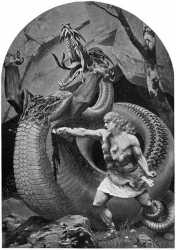Fáfnir
"Embracer." The eldest son of Hreiðmarr, and the brother of Ótr and Reginn. He was the strongest and the most aggressive of the three. After Ótr's death at the hands of Loki and the subsequent payment of weregild to Hreiðmarr, Fáfnir demanded his share of the money, but Hreiðmarr refused. Fáfnir killed his father in his sleep, and then went with all the gold to Gnitaheið, where he made himself a lair, and turned into a serpent.
Reginn plotted revenge and incited his foster-son Sigurðr to kill the dragon. He instructed him to dig a pit in which to lie in wait until Fáfnir crawled to the stream to drink, and then plunge his sword into the dragon's heart. Sigurðr did as instructed and succeeded in mortally wounding the dragon. The last moments of Fáfnir and his final conversation with Sigurðr are recorded in the eddic poem Fáfnismál.
Reginn cut out Fafnir's heart and told Sigurðr to roast it for him. Sigurðr tried with his finger to see if it was fully cooked, but burned his finger, and put it in his mouth. When Fáfnir's blood came on his tongue he suddenly understood the speech of birds. He heard nut-hatches chattering in the bushes and thus learned that Reginn planned to deceive him, so he hewed off Reginn's head. He then ate Fáfnir's heart, and drank the blood of both Reginn and Fáfnir. In Fafnir's underground lair he found a vast amount of gold and precious items, and filled two chests full thereof; he also took Hreiðmarr's fear-helm, a golden mail-coat, and the sword Hrotti, and many other precious things.
The story of Fáfnir is found in the eddic poem Fáfnismál, in Skáldskaparmál, and in the Völsunga saga. Fáfnir appears as Fafner in Richard Wagner's opera Der Ring des Nibelungen. There he is killed by Siegfried.
Some kennings for gold are Lair or Abode of Fáfnir and Metal of Gnitaheið.
❧
References
Sources
- Fáfnismál.
- Skáldskaparmál, 40.
- Völsunga saga, 13-18.
